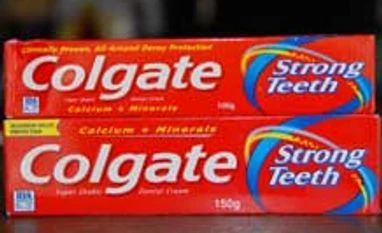Colgate-Palmolive India seems to have weathered the storm arising from rising popularity of peers, mainly Patanjali Ayurved. As feared earlier, it has not lost significant market share to competition. While demonetisation (note ban) had shifted some focus away from its naturals offering, Cibaca Vedshakti, experts believe this product will only aid Colgate in safeguarding its market share in an increasingly competitive toothpastes’ category.
“While competition is not new to Colgate, we argue that No 2 (Hindustan Unilever) or No 3 (Dabur) market share companies are more at risk from rising competition,” says Nitin Mathur, analyst at Jefferies. Colgate’s strong lead over peers also provides comfort. In 2016, Colgate’s market share stood at 55.4 per cent, much ahead of the next two peers that have market shares of about 20 per cent and 16 per cent. Colgate’s market share has ranged 55-56 in the four quarters of 2016. Globally as well, Colgate has demonstrated its ability to protect its turf even amid fierce competition, say analysts.
The demonetisation-related cash crunch, however, had impacted Colgate’s sales volume growth, which was down by an estimated 10-12 per cent year-on-year in the December quarter. This was largely due to the higher share of sales from the rural segment, which was impacted much more than non-rural regions. But, with the situation normalising and a host of catalysts for rural demand, Colgate’s sales volume growth is expected to trend upwards over the next couple of quarters.
Worries related to rising competitive intensity, coupled with demonetisation blues, had weighed on the Colgate stock, which has lagged behind the S&P BSE Sensex over the past three and six months. As these concerns abate, the stock has seen some momentum in the past one month. Even after the seven per cent rally in the past month, Colgate stock trades at 38 times the company’s FY18 estimated earnings. This is marginally lower than its three-year historical average and one-year forward price-to-earnings multiple of 40 times.
Against this backdrop of expected recovery in business and lower valuations, most analysts remain positive on Colgate and believe negatives are well captured in valuations. In fact, they expect an upside of 14-15 per cent from current levels of Rs 983. With large part of its capex (capital expenditure) behind, analysts expect Colgate’s return-on-equity ratio to reach 60 per cent levels in FY18 from about 55 per cent this financial year.
“We expect Colgate’s revenue growth to recover to double digits and model 19 per cent EPS CAGR over FY2017-20 aided by 300-basis-point Ebitda margin expansion on the back of benign input costs environment, better leverage, and lower ad spends,” wrote analysts at Kotak Institutional Equities in a recent note. EPS is earnings per share. CAGR is compound annual growth rate. Ebitda is earnings before interest, tax, depreciation, and amortisation.
To read the full story, Subscribe Now at just Rs 249 a month
Already a subscriber? Log in
Subscribe To BS Premium
₹249
Renews automatically
₹1699₹1999
Opt for auto renewal and save Rs. 300 Renews automatically
₹1999
What you get on BS Premium?
-
Unlock 30+ premium stories daily hand-picked by our editors, across devices on browser and app.
-
Pick your 5 favourite companies, get a daily email with all news updates on them.
Full access to our intuitive epaper - clip, save, share articles from any device; newspaper archives from 2006.
Preferential invites to Business Standard events.
Curated newsletters on markets, personal finance, policy & politics, start-ups, technology, and more.
Need More Information - write to us at assist@bsmail.in
)